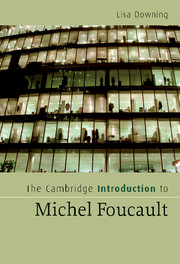Book contents
- Frontmatter
- Contents
- Preface
- List of abbreviations
- 1 Life, texts, contexts
- 2 Works: madness and medicine
- 3 Works: the death of man
- 4 Works: authors and texts
- 5 Works: crime and punishment
- 6 Works: The History of Sexuality
- 7 Critical receptions
- Afterword
- Notes
- Selected further reading
- Index
- The Cambridge Introductions to …
6 - Works: The History of Sexuality
Published online by Cambridge University Press: 05 September 2012
- Frontmatter
- Contents
- Preface
- List of abbreviations
- 1 Life, texts, contexts
- 2 Works: madness and medicine
- 3 Works: the death of man
- 4 Works: authors and texts
- 5 Works: crime and punishment
- 6 Works: The History of Sexuality
- 7 Critical receptions
- Afterword
- Notes
- Selected further reading
- Index
- The Cambridge Introductions to …
Summary
There is a significant difference between interdictions about sexuality and other forms of interdiction. Unlike other interdictions, sexual interdictions are constantly connected with the obligation to tell the truth about oneself.
Michel FoucaultOne of the most striking and original contributions for which Foucault is remembered is his counterintuitive contention and compelling theoretical demonstration that ‘sexuality’ has a history, which is constituted in the ‘link between the obligation to tell the truth and the prohibitions weighing on sexuality’ (EW i, p. 224). An erotic practice or ‘preference’ has not always, everywhere, been assumed to have the same significance; rather behaviours and choices that today we would understand as ‘sexual’ mean different things at different periods and in different locations. ‘Sexuality’, as we think of it today, is an invention of the late eighteenth and nineteenth centuries, produced by specific techniques for eliciting confession about individual desires and classifying and interpreting what was disclosed. Such are Foucault's claims in his audacious work on sexuality. This may seem surprising to readers new to Foucault, since commonplace wisdom says that sexuality belongs in the (often held to be unimpeachable) realms of the biological, the genetic, the psychological. We also think of it as something deep-rooted, individual, private and defining; as ‘ours’. Sexuality is the ineffable, surely, not a matter of words, constructions and fields of knowledge? This is precisely the kind of thinking with which Foucault wishes to take issue.
- Type
- Chapter
- Information
- The Cambridge Introduction to Michel Foucault , pp. 86 - 103Publisher: Cambridge University PressPrint publication year: 2008

